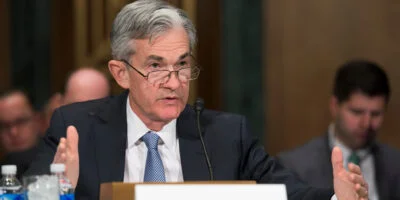Nuts to Higher Inflation
The chorus of voices calling for higher inflation is growing. Joining “respectable” mainstream economists like Harvard’s Greg Mankiw and Ken Rogoff is Rex Nutting at Marketwatch. To his credit, Nutting identifies the big problem in the US economy pretty well: US debt levels are too high—367% of GDP as of 2009, compared to just 150% 30 years earlier. There is clear need for deleveraging. Traditionally, in a market economy, this would be accomplished through a painful (but necessary) process of liquidation and bankruptcy. But Nutting argues that this will take too long given the huge scope of the debt problem (darn that rule of law!), and that prospects for income growth to reduce the real debt burden are dim to nil. But higher inflation would help, according to Nutting, “allowing debtors to use cheaper dollars to pay off debts.”
As mentioned, many economic luminaries agree with this idea in principle, including several at the Fed. Nutting cites recent speeches by Chicago Fed president Charles Evans and much older remarks by pre-Fed Bernanke, who was explicit about central banks intentionally juicing up inflation to end an economic slump. But now Bernanke is in a politically delicate position. Hemmed in by anti-inflation “hawks” within the Fed’s Open Market Committee (Bernanke has faced down a remarkable 3 dissenting votes in each of his last policy moves) and by “hard money” forces on the political right (i.e. the Ron Paul faction of the Tea Party), Bernanke is frozen into inaction. Although the theory of using inflation to ease our way out of this crisis is sound, claims Nutting, the will is sadly lacking.
What strikes me most about these ever more strident calls for inflation is not the core idea of reducing real debt burdens. Any student of monetary history knows that debtor interests are wont to lobby for outright inflation when times get tough—off the top of my head, I can think of at least 3 such episodes in US history alone: the post-revolution state currency printing sprees, the silverite movement of the late 1800s, and the anti-gold arguments of the 1930s.
No, what is almost shocking about the new inflationists is their seeming disregard for the true victims of inflation. Nutting seems to think that only the big creditors—the banks—will suffer (and hence inflationism should appeal to the OWS types). But overlooked is the effect of surging inflation on real interest rates. With the Fed committed to holding short term rates near zero for 2 more years, and making continued efforts to keep long term rates at historic lows as well, the effect of inflation that I find perhaps most bothersome is the depression of real interest rates (and bond yields) into negative territory. This hurts many people, not just the big banks.
Current CPI inflation is a shade under 4%. With bank CDs paying 1%, this implies savers are being systematically scalped of 3% of their real purchasing power. Rogoff and the like wouldn’t mind seeing this tax raised to 5% or more. Americans currently hold around $6 trillion in old-fashioned savings deposits. Current inflation rates ensure that this money systematically loses value, not to mention the jacked-up inflation rates that Nutting and others desire. Yet Nutting blithely contends, “A mild bout of inflation would let us share the pain of deleveraging with the upper classes, which have benefited inordinately over the past 30 years of deregulation, globalization and low-inflation policies… Compared with the pain of 9% unemployment, 3% or 4% inflation would hardly hurt at all.” Try getting that one past the millions of American savers who risk getting burned in a big way if this inflationary beast is unleashed upon them.
Image from freedigitalphotos.net/criminalatt








